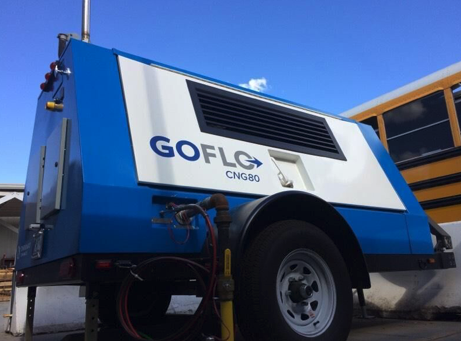This week is National Small Business Week, and CRES is highlighting the efforts that small businesses around the country have contributed to advancing clean energy technology.
In the state of Oregon, we were introduced to Onboard Dynamics through our friends at Clean Energy Business Network (CEBN) and wanted to share their story. Natural gas compression technology offers an efficient way to get a cleaner and more affordable alternative to diesel fuels.
CEO Rita Hansen was profiled by CEBN last year as part of the “Faces Behind the Facts” series, and here at CRES, we want to highlight how the company has grown thanks in part to its ARPA-E funding.
Great Potential for Compressed Natural Gas as a Transportation Fuel
Back in 2013, the United States ranked 18th in the world as far as using natural gas as a transportation fuel—quite low given our abundant domestic natural gas resources.
One of the most practical ways to utilize these resources is to develop Compressed Natural Gas (CNG), which is produced by compressing natural gas to less than 1 percent of its volume at standard atmospheric pressure. So ARPA-E provided a $1 million seedling award to Dr. Chris Hagen, an assistant professor at Oregon State University, to work on a concept for integrating natural gas compression into an automotive engine.
Challenges with Commercialization & Growth
Although Dr. Hagen’s research was compelling, it wouldn’t do much good if it remained behind the walls of OSU. The CNG technology he developed needed to be commercialized to build out the necessary storage and refueling infrastructure to make it widely accessible to consumers.
Fortunately, he met Ms. Hansen, who immediately recognized the opportunity. She then co-founded Onboard Dynamics (Onboard) and, much like any other small business, got off the ground with backing from local entrepreneurs and a strong local ecosystem in the city of Bend and the State of Oregon, particularly cleantech incubator Oregon BEST and the Oregon Nanoscience and Microtechnologies Institute (ONAMI).
But even with that support, Onboard had a very, very lean operation and would most likely struggle to get to the next level. This simply wasn’t technology that you could go out and raise major capital from private parties and big-time venture capitalists; it was very early and just coming out of the university.
ARPA-E Saves the Day
ARPA-E also realized that it still needed to get the technology to a tipping point before major investors would buy in, so it looked for companies to invest in through its Methane Opportunities for Vehicular Energy (MOVE) program, which focuses on investing in up-and-coming technologies to find cost-effective ways to encourage the adoption of CNG and other innovations. Onboard received ARPA-E funding in 2014 and was able to scale up its operations quickly.
“We were really able to focus on those activities associated with commercializing the technology, out of the university setting and into the marketplace,” Hansen explained in our short video below.
Onboard’s First Product Could be a Gamechanger
Building out enough refueling stations would be an enormous undertaking—the only practical way to do so would be to find a sort of force multiplier that would be able to match the impact of a number of existing stations with a single piece of infrastructure. Onboard Dynamics developed that missing piece with its first product to market.
The GoFlo CNG80 provides on-site, cost effective CNG fueling—without the need for electricity. It’s mobile, so it could quickly make CNG available at many locations around the country.
“We are targeting fleets of all kinds of shapes and sizes, medium-duty and heavy-duty fleets you would find in waste hauling businesses, school bus districts, anybody who wants to actually reduce their fuel costs, reduce their labor, and cut emissions,” Hansen said.
“That transition to natural gas is going to be clear and logical,” she added, “We see the growth happening from 24 million natural gas vehicles to 32 million vehicles by 2025, and we will be the company that drives that growth.”
What a breakthrough—and it wouldn’t have been possible without ARPA-E supporting small businesses like Onboard Dynamics. CRES supports America’s small businesses working in energy innovation, and we love the fact that it creates jobs, helps strengthen the economy, and decreases our reliance on outside energy sources.
Want to see more? View CRES Forum’s video interview with Rita Hansen, CEO of Onboard Dynamics, below:

